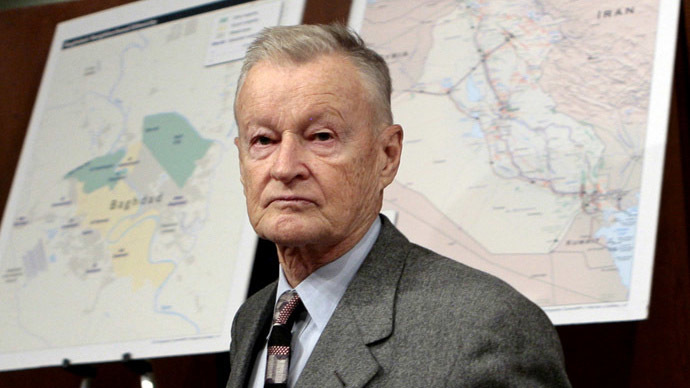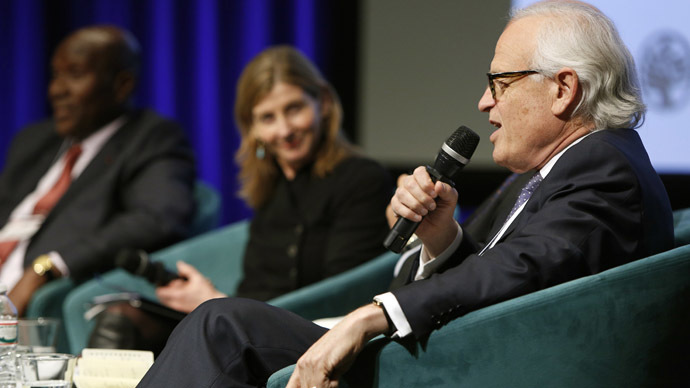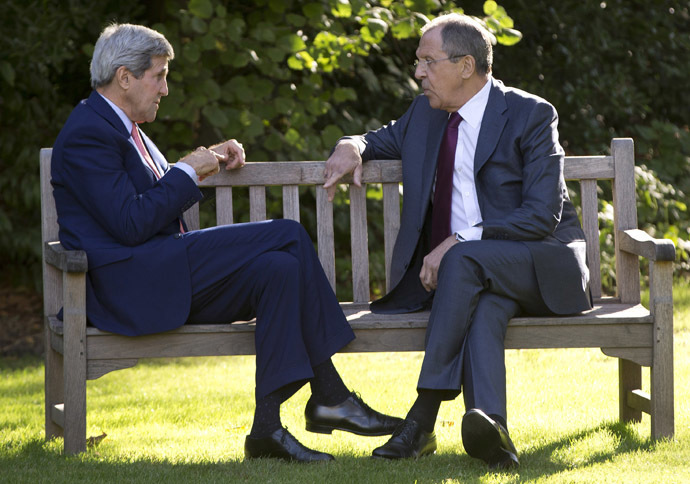American think tank policy: Not for or by the people

The world seems more volatile, dangerous, and chaotic than it was even a year ago. The smoldering embers of a potential holocaust are nearly everywhere. With the America-EU-Russia divide, potential EU-Russia integration has been rethought by the West.
In this report I will show one major reason for this course reversal. I will also illustrate in so doing, that the policy forgers in America, are nothing like the rest of us.
I watched the other day, some Russians burning an American flag. Then a few hours later, I saw students in America burning an effigy of Vladimir Putin. The events worried me greatly. I realized that our patience is wearing thin, that our feelings are now raw. Americans, Europeans, and Russians alike, grow weary of insult and injury perpetrated by leaders who seem to know nothing of us at all. Instead of citizens blaming one another, perhaps Americans and Russians can hold accountable the real perpetrators of today’s East-West crisis.
To begin let me quote from the great American historian, author, and anti-war activist Howard Zinn who said:
“There has always been, and there is now, a profound conflict of interest between the people and the government of the United States.”
In 1979 Zbigniew Brzezinski was then President Jimmy Carter’s National Security Adviser. He and other great thinkers in Washington devised strategies that created for the Soviets, a world strategic emergency just like the one we see today in Ukraine. The Soviet Union, baited into invading Afghanistan, got mired in 10 years of useless conflict. As for Zbigniew Brzezinski now, he is pointedly unapologetic that his theories have been deployed in bringing down regimes, and forging American strategic aims, for better or for worse. Brzezinski, along with other key figures like former Secretary of State Henry Kissinger, former Secretary of Defense and CIA Director Robert Gates, and myriad disciples, they sit seemingly everlasting, like stone statues in some Pantheon of American exclusivist control. It is their thinking that has set us all at odds.
Washington’s stinking thinking
There’s a term that Brzezinski and other think tank brains adhere to, it’s a term the Council on Foreign Relations defines, a central strategic idea known as the “Arc of Crisis.” The concept is essentially an American strategy aimed at surrounding Russia, an ongoing and devastatingly negative fight against a convenient and well known foe. Brzezinski is used in this piece as a sort of “poster boy” for all Washington elitist movers and shakers. His books, such as; The Grand Chessboard, published in 1997, have become templates for events like the Arab Spring, the resurgent Iraq fiasco, and pointedly the Ukraine crisis. To understand today’s crisis, one has to investigate the players behind the White House.
Back in 1979 Brzezinski and his contemporaries like former CIA Director and Secretary of Defense Robert Gates, concocted a plan to bait the Soviets into invading Afghanistan by giving aid to the Mujahedeen. The end result was tens of thousands of Russians and Afghanis dead, millions displaced, and for Brzezinski, he’d created a foreign policy “how to” for dealing with Russia. Back then, as now, Moscow did its best to show the reasons for the invasion, but to no avail. The mainstream media, and PR strategists, they ensured the American people would never believe the Russians.
Brzezinski’s documented intentions in the 1979 affair were to ensure that the Afghanistan intervention; “led to the demoralization and the breakup of the Soviet empire.” And this, he admitted later, was prioritized in his mind as, “at any cost.” However, an unforeseen result of funding the Mujahedeen back then, was the conflict America would have with more familiar modern forms of extremism (see Osama bin Laden), this was “a justified means” to the task of ending the Soviet empire. This is another story though.
Today, Brzezinski’s former pupils, and protégés, his influential think tank comrades, their business interests, they range from his son Ian Brzezinski, to ambassadors, industry titans, CIA and NSA directors, hedge fund capitalists, and yes, US and foreign presidents. Within the ranks of these think tanks we find Barack Obama advisers like Ambassador to China Jon Huntsman (former Utah Governor). Interestingly, Huntsman was caught on amateur video in Beijing allegedly lending support for the so-called Jasmine Revolution. As for the administrations they’ve advised, this group of peers has counseled everyone since Richard Nixon.

What are they thinking?
If policy by the elite were not a bad enough issue for America, the revelation of the New York Times exposing cases where Washington think tanks received massive funding from outside the United States should be. Norway to Qatar and beyond, organizations like the Atlantic Council received funds at an alarming rate before and after Barack Obama’s inauguration. This graphic from the NYT piece paints a vivid picture of a Washington disconnect from the American people, and intensifying ties to foreign interests implicated in current crises. Outside interests essentially lobbying for US strategy to serve their purposes!
Moving forward past the tens of millions funding Washington think tanks, the Center for Strategic and International Studies (CSIS), and organizations like the Brookings Institution are the playgrounds for the Brzezinskis of the world. For your scrutiny, here’s a short list of his contemporaries, and some interesting affiliations:
Sam Nunn – Former US Senator and head of the Senate Armed Services Committee – is a co-chairman & CEO at CSIS now. Nunn was on the board of directors of Hess oil company, Chevron Corporation, and Texaco up until just recently. Interestingly, Hess sold off its Russia operations in April 2013 to Lukoil for $2.05 billion days after Nunn retired, and just five months prior to the Euromaidan events in Kiev.
Richard Armitage – A CSIS trustee and the 13th United States Deputy Secretary of State, Armitage was part of the so-called Plame affair, admittedly having divulged classified knowledge that Valerie Plame Wilson was a CIA operative. Colleagues claim when he was in Vietnam, Armitage was part of the CIA’s notorious Phoenix Program. He’s been a close advisor, and has had roles from Tehran before the Shah was deposed, to Afghanistan. Armitage is currently on the board of directors of ConocoPhillips Oil Company. Conoco sold its interests in Russian oil in 2010.
Lois Dickson Rice – The mother of Barack Obama’s National Security Advisor, Susan Rice, is Director of the Think Tank Consortium at Brookings. Both have been distinguished fellows of Brookings, and Rice the junior also served as a Clinton adviser and Ambassador to the UN. Susan Rice’s long time mentor former Secretary of State Madeleine Albright, was a student of Zbigniew Brzezinski, and later served under him at the National Security Council.
Henry Alfred Kissinger – This CSIS counselor and trustee literally needs no introduction. The 56th U.S. Secretary of State has been credited on the one side with recreating foreign relations intellectually and strategically. Conversely, from the Vietnam era to Senator John McCain’s defense of the dignitary at the now notorious “Get out of here you low-life scum” hearings where Kissinger was called a murderer, the aging think tank brain is part of the problem for many.
Rex W. Tillerson – The Chairman and CEO of Exxon Mobil is also a CSIS trustee. Tillerson came to prominence around the time the company's holdings in Russia and the Caspian Sea grew in prominence. In 2011 he signed an agreement with the Russians for drilling in the Arctic estimated to be worth $300 billion. Exxon reportedly lost out in Siberia and in the Black Sea because of the Ukraine crisis. However, factoring in vast natural gas deals in Australia and North America, this puts Tillerson at the head of think tank curiosities, and especially given Australia’s Prime Minister Tony Abbot’s vehement anti-Russia temperament.

Brent Scowcroft – An advisor to presidents Nixon, Ford, Lieutenant General Scowcroft had or does hold key positions within the Washington “thinking elite’s” ranks. Bush administration, Scowcroft was Vice Chairman of Kissinger Associates, founder of The Forum for International Policy think tank, co-chair of Aspen Strategy Group, a member of the Trilateral Commission, Council on Foreign Relations, and board member of The Center for Strategic and International Studies (CSIS), as well as The Atlantic Council of the United States. His discussions of foreign policy with Zbigniew Brzezinski led by journalist David Ignatius were published in the 2008 “America and the World: Conversations on the Future of American Foreign Policy.”
David M. Rubenstein – Rubenstein is on the Board of Trustees of think tank the Brookings Institution, and Co-Founder and Co-CEO the Carlyle Group. The Jewish billionaire was the domestic policy adviser to Jimmy Carter before forming the equity firm that has offices in 33 countries, with 1,500 limited partners in 75 countries worldwide. The largest private equity firm in the world according to Private Equity International (PEI), the group has on its lists of acquisitions the media conglomerate Nielsen Holdings N.V. Nielsen operates across over 100 countries and employs some 40,000 people worldwide. This fact leads nicely into where policy meets information and the public.
I could go on, and on, and on, and on…
Thinking: Not of Us
Whether you’re an Atlanta or Moscow resident, it’s clear the current crisis is not of our own making. In a very real way we are all victims of a strange Orwellian plutocracy. Canadian Parliamentarian and author Chrystia Freeland puts these modern plutocrats in perspective in her book; “Plutocrats: The Rise of the New Global Super-Rich and the Fall of Everyone Else.” Speaking of the elite mindset, Freeland states:
“You don't do this in a kind of chortling, smoking your cigar, conspiratorial thinking way. You do it by persuading yourself that what is in your own personal self-interest is in the interests of everybody else.”
The CSPAN segment below is at a Senate Armed Services Committee hearing with several of today’s key policy evangelists. Former National Security Advisers Zbigniew Brzezinski and Brent Scowcroft (both at CSIS) testified using such deep intellectual language, an apparently exclusive terminology and theory, as to forever cement their separateness form the rest of us.
Listening to Scowcroft’s “undermining of the Westphalia Structure,” I wonder how many who’ve never studied European history even know of the events of 1648? Listening and watching, it’s apparent these people look at everything in an adversarial way. Take a look at one part of General Scowcroft’s testimony about governing people:
“For most of history, most of the people of the world did not participate in the politics of their system. They were just like their parents; they expected their children to be just like them, and so on. Now, they are surrounded by information and they are responding, they are reacting to it.”
So a globalized and informed public is problematic? Perhaps this is why we have been subjected to a cohesive mainstream media onslaught? The massive PR efforts, billionaire media moguls and their part, these all make more sense when media and advertising are considered. Scowcroft’s “cyber weapons,” they’re not just for Russia and China to use, America certainly has her countermeasures! Right now Ukraine is in flames just because Russia-friendly President Viktor Yanukovich said“no” to the EU in favor of Vladimir Putin’s Eurasian Economic Union? Or is it because Russia is still Soviet to these ruling Washington thinkers? A partial answer lies in examining Russia’s policies toward the EU before the current crisis. Vladimir Putin’s endeavors to integrate with greater Europe, and toward a greater EU-Russia economic integration even before 2010, I believe these policies scared some people to death in Washington. Putin’s view was summed up in policies he made when Prime Minister. The so-called Lisbon to Vladivostok initiative laid out a mutually beneficial integration with the EU which would have spelled peace and prosperity for hundreds of millions. I quote from the English version via Spiegel International:
"We propose the creation of a harmonious economic community stretching from Lisbon to Vladivostok…In the future; we could even consider a free trade zone or even more advanced forms of economic integration. The result would be a unified continental market with a capacity worth trillions of euro."
Now that we have at least a partial answer, the think tanks possessed of old Cold War ideas saw Putin’s initiatives as a threat. Regardless of the prosperity and peace Europe and Russia might enjoy, the prime directive for Washington has been to prevent Lisbon to Vladivostok.
Like some of you, I imagine an alternative reality. I can see a million or more safe at home in Ukraine, instead of in refugee camps in Russia. I can also envision parents playing with their children there, instead of looking down tearfully into their tiny caskets in the Donbass. Maybe all our problems are so simple after all? Maybe if the thinkers out there would really think, instead of extending their own legend or bank accounts, then America and Russia together might help change the whole world for the better! I wonder now, as an American; “What if Vladimir Putin’s Lisbon to Vladivostok plan were successful?”
Instead we are left to the devices of brilliant rich people and their meetings we’re not invited to.
Phillip Butler for RT
Phil Butler is journalist and editor, and a partner at the digital marketing firm, Pamil Visions PR. Phil contributes to the Huffington Post, The Epoch Times, Japan Today, and many others. He's also a policy and public relations analyst for Russia Today, as well as other international media. You can find Phil's blog at http://www.phillip-butler.com.
The statements, views and opinions expressed in this column are solely those of the author and do not necessarily represent those of RT.
The statements, views and opinions expressed in this column are solely those of the author and do not necessarily represent those of RT.












